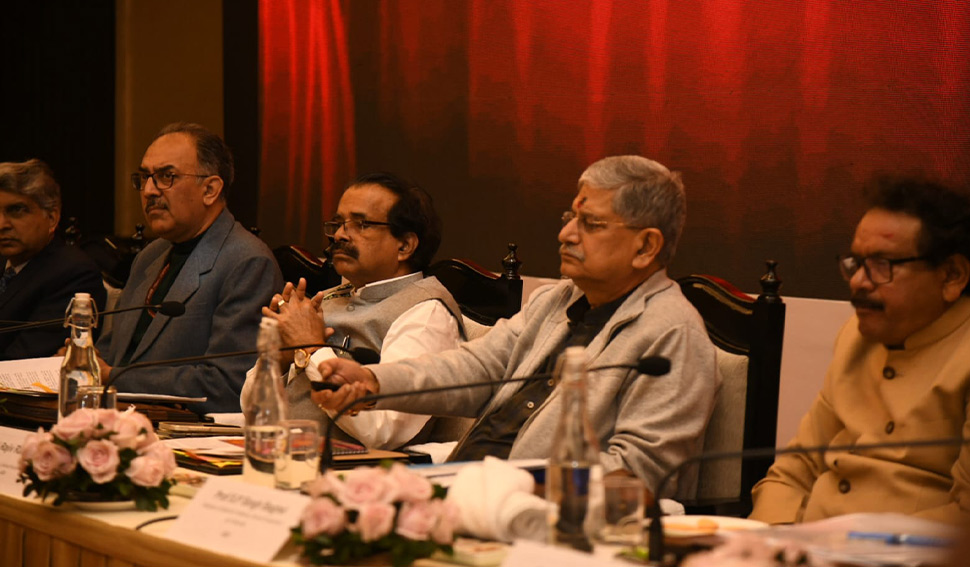Union Minister Rajiv Ranjan Singh launches organic fisheries cluster in Sikkim under PMMSY

As part of the Northeastern Region States Meet 2025, Union Minister for Fisheries, Animal Husbandry, and Dairying, Rajiv Ranjan Singh, in the presence of Ministers of State Prof. S.P. Singh Baghel and George Kurian, announced the launch of the Organic Fisheries Cluster in Soreng district of Sikkim at a city hotel in Guwahati on Monday.
This groundbreaking initiative under the Pradhan Mantri Matsya Sampada Yojana (PMMSY) marks a significant milestone in promoting sustainable and eco-friendly fisheries in the Northeast.
The Organic Fisheries Cluster aligns seamlessly with Sikkim’s pioneering reputation in organic farming, further cementing its status as a leader in sustainable and environmentally friendly agricultural practices.
Organic fisheries cluster focuses on ecologically healthy fish farming system avoiding the use of harmful chemicals, antibiotics and pesticides. This also ensures minimal environmental pollution and prevents damage to aquatic ecosystems, contributing to sustainable fish production practices. Organic products typically attract a premium in both domestic and international markets. By establishing an organic aquaculture cluster, Sikkim could tap into this growing market and export of organic fish and fish products. An organic fisheries and aquaculture cluster in Sikkim with special focus on amur carp alongwith other carps would offer a range of economic, environmental, and social benefits. By integrating organic fish farming into the state’s already successful organic farming framework, Sikkim can position itself as a pioneer in sustainable aquaculture.
This could not only enhance the state’s agricultural economy but also contribute to the global shift toward sustainable, eco-friendly food production.
National Bank for Agriculture & Rural Development (NABARD) is a key stakeholder in developing the fisheries and aquaculture organic cluster in Sikkim. NABARD besides providing financial and technical supports for the requisite fisheries infrastructure and capacity building, will also facilitate in growth of the organic cluster by engaging fishers’ cooperatives and formation of fisheries-based Farmer Producer Organizations (FFPOs) in the state.
This initiative will also encourage private investment in aquaculture infrastructure and technology, branding of Sikkim cold water fisheries, attract tourism as well as strengthen the value chain, empower local fishers and fish farmers, and foster sustainable growth in the fisheries sector in the State of Sikkim.
The launch of the Organic Fisheries Cluster in Sikkim reflects the government’s broader vision of sustainable fisheries development across the Northeastern Region. With its cluster-based approach under PMMSY, the Department of Fisheries aims to enhance competitiveness, address value chain gaps, and drive innovation in the fisheries sector.
The PMMSY, a scheme to bring about Blue Revolution through sustainable and responsible development of fisheries sector in India, implemented by the Department of Fisheries, Ministry of Fisheries, Animal Husbandry and Dairying in all the states and Union Territories (UTs) inter-alia provides adoption of a cluster-based approach to enhance the competitiveness of the fisheries sector, facilitate economies of scale, generate higher incomes, accelerate the growth and expansion of fisheries and aquaculture in an organized manner..
The cluster-based approach enhances competitiveness and efficiency by uniting geographically connected enterprises of all sizes like micro, small, medium, and large across the entire fisheries value chain, from production to exports. This collaborative model improves financial viability through strong linkages, addresses the value chain gaps, and creates new business opportunities and livelihoods. By fostering partnerships and resource sharing, it aims to reduce costs, promote innovation, and support sustainable practices.
The Department of Fisheries has envisaged a strategic focus on cluster-based development as production and processing clusters across key areas including Pearl, Seaweed, Ornamental Fisheries, Reservoir Fisheries, Fishing Harbour, Saline Water Aquaculture, Cold Water Fisheries, Sea Cage Culture, Freshwater Aquaculture, Brackish-water Fisheries, Island Fisheries Clusters, Organic Fisheries, Wetland Fisheries and other areas as per the sectoral and location specific needs. These clusters will engage varied value chain stakeholders such as fishers, enterprises, individuals, Self Help Groups (SHGs), Joint Liability Groups (JLGs), Fish Farmer Producer Organizations (FFPOs), fish famers, processors, transporters, fish vendors including retailers, wholesalers, consumers, cooperatives, fisheries start-ups and other entities for sustainable development of fisheries and aquaculture.
To advance this vision, the Department of Fisheries, Government of India has already notified four fisheries-related clusters such as Pearl Cluster in Hazaribagh District of Jharkhand, Ornamental Fisheries Cluster in Madurai District of Tamil Nadu, Seaweed Cluster in UT of Lakshadweep and Tuna Cluster in Andaman & Nicobar.

Leave a Reply